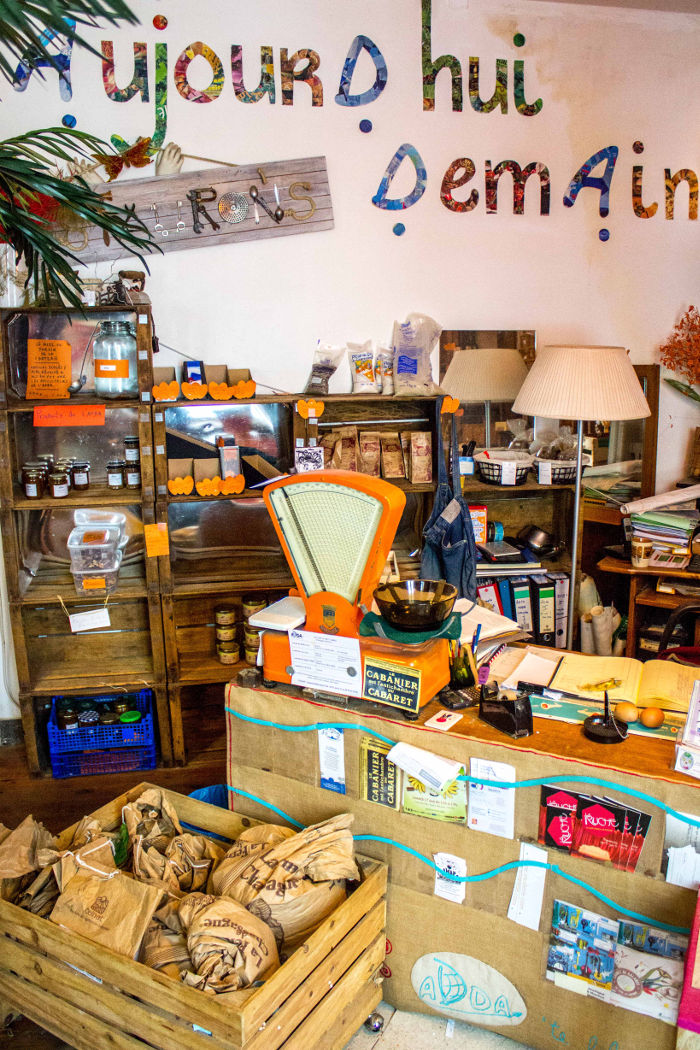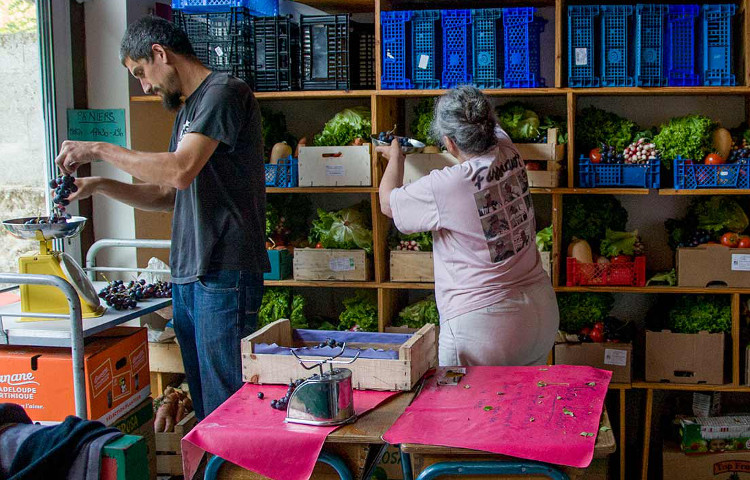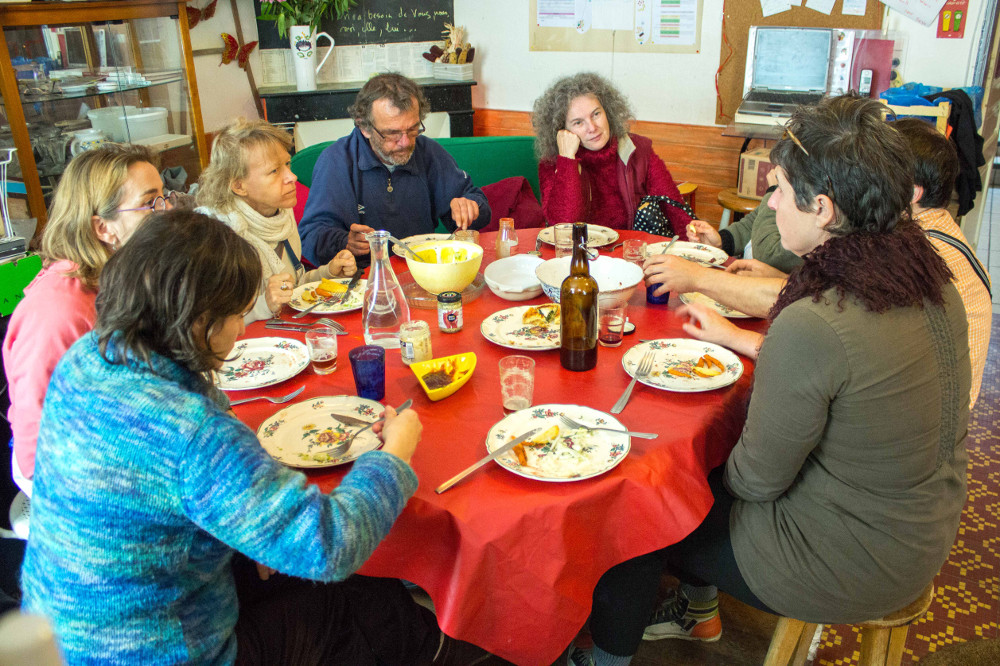Introduction
ADDA is a French association in Nantes, a city of 300.000 inhabitants. ADDA means ‘Aujourd’hui restaurons demain’, which could be translated by ‘Today, we have to feed tomorrow’.
I know the ADDA association because I was involved in it. I cannot say that I was involved a lot, mainly I was buying my food there, talking with people and helping from time to time. However I had time to discover how they work and to know some of the people who work there.

***
ADDA: What is it and how did it start?
ADDA is a cooperative of customers who buys food directly from farmers (AMAP system) and develops other solidarity actions.
A couple living in Nantes, Claire and Xavier, decided to be active against the climate change and the destruction of earth’s ecosystems. They created their own association based on the following challenge: how to help everyone to make their food consumption sustainable and healthy? They opened a food hub on the first floor of their house and got in touch with some farmers and customers.
Today ADDA association has around 300 members. Who are the members? Everyone who pays the annual fee (10-30 euros) and who buys some food from ADDA. The members are invited to help as volunteers if they wish. ADDA works only with volunteering which allows the association to have low running costs. There is no director either, the association is run by an elected Administration Committee (every member is invited to vote as well as to be a candidate).
***
ADDA: ecologically and socially sustainable

ADDA is an AMAP. AMAPs help farmers as the customers pay the products directly to them one season or one year in advance. This way AMAPs support responsible farming[1]. The absence of intermediary (as a supermarket) between farmers and customers also allows the farmers to earn more money while the customers buy their food for cheaper than usual.
Even if it is cheaper, not everyone can afford these responsible farming products, particularly one year or one season in advance. That’s why ADDA decided to do more than the ‘traditional’ AMAP. Firstly, ADDA doesn’t ask the customers to pay in advance. People can subscribe for a basket from week to week and they pay it only one week in advance. The farmers are paid one year in advance thanks to the budget of the association.
In addition, there are some discounts for people in need: in each delivery of food baskets, seven baskets can be sold for 6 or 4 euros, instead of 10 euros. People don’t need to prove that they need this discount and they don’t need to write their name. The payment is anonymous; thanks to that people don’t feel to be stigmatized as ‘poor people’. This system works on trust, fighting against the mistrust which is separating people in our societies today. The trust facilitates solidarity between people and encourages each of us to be responsible for our own actions.
With such system, ADDA works on the social aspect of sustainability as much as on the ecological aspect (see previous article ‘Why sustainability is not only ecology’). This allows ADDA to touch more people in the society and to create links between people instead of enlarging the gap between people who can afford healthy and responsible food and those who cannot afford it.
***
ADDA: food and more food
The grocery: In addition to distributing the baskets of vegetables, ADDA also runs a grocery store. They sell lots of local products (flour, honey, salt, eggs…) and some long-distribution channel products as chocolate, spices or coffee. These products are fair-trade and mostly organic. Long-distribution products are taxed more than the short-distribution ones. These taxes are not state-taxes but margins that the ADDA earns on the sold products. This, along with the membership fees, is the main source of money for running the association and paying the farmers in advance in the beginning of each season.
Free food from the MIN market: Three times a week two volunteers go to the MIN market of Nantes (Marché d’intérêt national; the second biggest market of France, after Paris, where the sellers buy in bulk) and pick up every food which would be thrown away because it is too ripe for being sold or because it is aesthetically not perfect enough. Thus the ADDA association fights against waste and offers free food to its members, helping many people who have economical difficulties.

***
ADDA: more than food
ADDA also offers free gardening in a garden shared with another association and free collective meals, two times a week, which are also the opportunity for meeting people, talking about some important issues or just about daily life and having a good time. People have lots of opportunities to meet each other in ADDA’s place and every member can be involved as he/she wishes in the association running. Thereby new projects emerge easily and the ADDA activities are more and more diverse. This offers people more and more opportunities to act sustainably.
For example, ADDA also organizes the sharing of objects (given or borrowed), of skills (thanks to some workshops as bike fixing or sewing) and of knowledge (thanks to the free library and to some conferences that each one can offer for sharing his knowledge and open a discussion).
***
Conclusion
The ADDA association has a big impact on the society because people involved in it are concerned about environment, never forget to include as much people as possible in the process and pay attention to the social or economical difficulties that some people face. ADDA is also supporting alternative, more sustainable distribution system. ADDA strives for a society which is ecologically, socially and economically sustainable, valuing any of these three aspects of sustainability as much as any other one.
According to me, a city is a great place for such sustainable actions: in cities it is much easier to involve lots of people in a common project as it is close to their home. The distance between people and the lack of public transportation in countryside can be an obstacle for developing such projects. However I believe the potential of cities for sustainability is even bigger if they develop strong links with the countryside. AMAP does that, but many other ways are also possible.
Source : https://sites.google.com/a/adda.asso.fr/adda/
Anna Vittet, EVS volunteer from France
__
[1] Responsible towards the ecosystem and towards the customers.